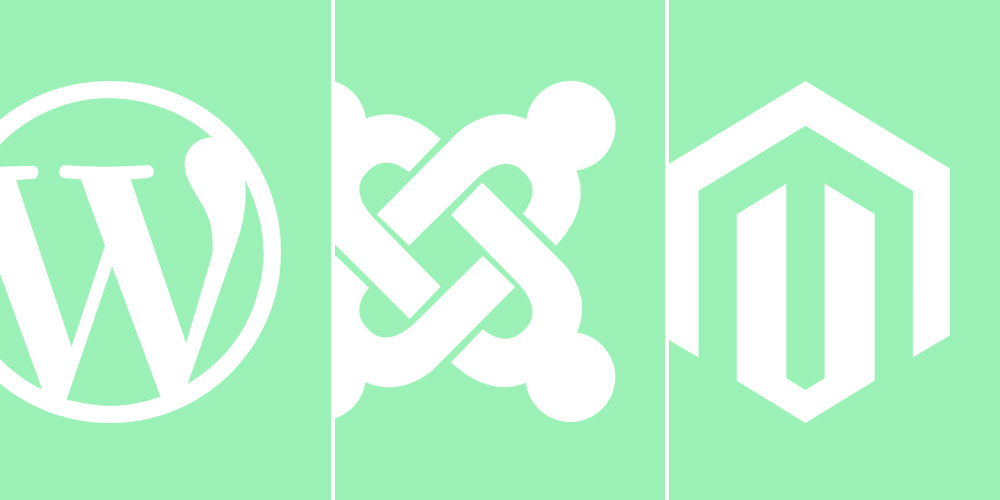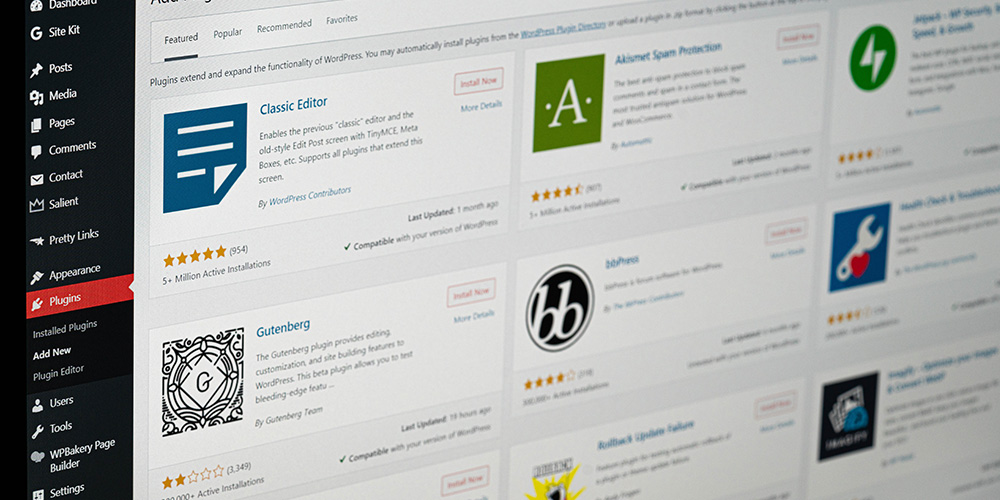
Choosing the right content management system is crucial for building a successful online presence. Among the popular CMS options are WordPress, Joomla, and Magento which stand out as powerful platforms with distinct features.
In this article, we will explore the pros and cons of each CMS to help you make an informed decision that aligns with your specific requirements.
Table of contents
WordPress
WordPress is renowned for its user-friendly interface and extensive plugin ecosystem. Let’s examine the pros and cons of using WordPress:
WordPress pros
- User-Friendly: WordPress offers a straightforward setup process, an intuitive dashboard, and a vast community that provides resources and support. Even without technical expertise, users can easily manage and update their website content.
- Customisation: The flexibility of WordPress enables unique and visually appealing sites to be created. With thousands of themes and plugins, your WordPress developer can create a highly customisable solution, tailored to your specific needs.
- SEO-friendly: WordPress incorporates built-in SEO features such as editable permalinks, meta tags, and SEO plugins, enabling better search engine visibility. This CMS helps optimise your content and boosts your website’s visibility in search engine results.
- Blogging capabilities: Originally designed as a blogging platform, WordPress excels in post management, making it ideal for content-driven websites. It offers features like categories, tags, commenting systems, and RSS feeds, empowering bloggers to create engaging and interactive content.

WordPress cons
- Security: Due to its popularity, WordPress can be susceptible to security vulnerabilities with hackers often targeting the platform. However, by regularly updating themes, plugins, and employing measures such as strong passwords and a firewall, you can significantly enhance the security of your WordPress website.
- Complexity with e-commerce: While WordPress offers e-Commerce functionality through plugins like WooCommerce, managing large-scale online stores may require additional customisation and technical expertise.
Joomla
Joomla is known for its flexibility, scalability, and advanced user management capabilities. Let’s explore its pros and cons:
Joomla pros
- Flexibility: Joomla provides a high degree of flexibility, allowing you to create various types of websites from personal blogs to complex corporate platforms.
- Robust user management: With built-in management features, Joomla offers fine-grained control over user permissions and access levels, making it suitable for membership-based websites or websites with multiple contributors.
- Multilingual support: Joomla includes powerful multilingual capabilities, enabling you to build websites in several languages. This factor is particularly advantageous for businesses with an international audience.
- Scope for expansion: Joomla boasts an extensive collection of extensions, ranging from templates and modules to components that provide additional functionality. This scope to add new features makes it easier to expand the capabilities of your website.
Joomla cons
- Learning curve: Joomla’s advanced features and customisation options come with a steeper learning curve compared to WordPress. Beginners may find it slightly more challenging to navigate and update and need some Joomla expertise. However, once familiarised with the platform, users can take full advantage of its capabilities.
- Smaller community: Although Joomla has an active user base, it is much smaller than that of WordPress. Finding specific solutions or troubleshooting might take more effort due to a smaller pool of developers and community resources. However, Joomla still offers substantial support through forums, documentation, and community-driven initiatives.
Magento
Magento – or Adobe Commerce – is a dominant player in the e-commerce development industry, offering robust features for online stores. Let’s look at its advantages and disadvantages:
Magento pros
- E-commerce focus: Magento is designed specifically for e-commerce, offering comprehensive features for managing products, payments and shipping. It provides an all-in-one solution for creating and managing online stores.
- Scalability: With its ability to handle large product catalogs and high levels of website traffic, Magento is a preferred choice for businesses with ambitious growth plans. It provides a scalable platform that can adapt to the evolving needs of your expanding e-Commerce business.
- Customisation: Magento provides extensive options, allowing you to tailor your online store to match your brand and customer experience. With its robust framework, you have the flexibility to create unique shopping experiences and implement specific business requirements.
- SEO features: Magento offers built-in SEO features such as search engine-friendly URLs, sitemaps, and metadata management to improve your store’s search visibility. Magento also provides the tools to update product pages, descriptions, and other elements crucial for better organic search rankings.

Magento cons
- Complexity: Magento’s advanced features and functionalities can make it more complex to set up and maintain compared to other CMS platforms. It requires a higher level of technical expertise to fully utilise its capabilities so employing Magento developers may be necessary for optimal results.
- Resource-intensive: Due to its robust nature, Magento demands more server resources including hosting, memory, and processing power, which can result in higher costs compared to other CMS options. Adequate server infrastructure is essential to ensure optimal performance.
Conclusion
WordPress, Joomla, and Magento offer unique strengths and weaknesses.
WordPress stands out for its user-friendly interface, extensive plugin ecosystem, and its suitability for content-driven websites.
Joomla excels in flexibility, advanced user management, and multilingual support, making it ideal for various types of websites.
Magento shines as a top choice for e-commerce websites, providing comprehensive features, scalability, and customisation options tailored for online stores.
When choosing the right CMS, consider your specific needs, technical expertise, budget, and long-term goals to make an informed decision. Remember, all three platforms have active communities and can empower you to build a successful online presence.


